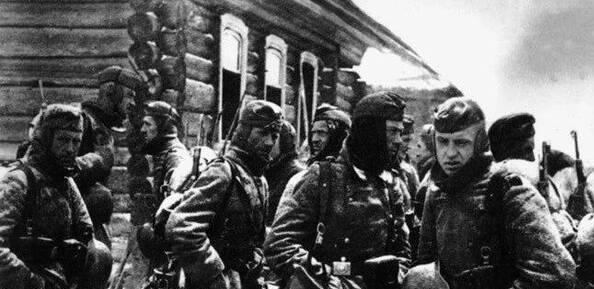In December 1941, the Germans attacking Moscow were forced
After being forced to retreat across the board
Hitler was convinced of his defeat on the Eastern Front. By mid-1944, Axis forces had been driven out of soviet territory and forced to withdraw from Africa; peace had been achieved in Italy; Anglo-American bombers had launched successive bombings of Germany from the air; allied forces were ready to return across the Strait and launched a landing on Normandy.
It was during this period that the Eastern Front experienced the most brutal defensive battles in Leningrad and Stalingrad, as well as the largest tank battles in the Kursk region. The Western Allies gradually gained self-confidence and strength, first in the North African region, then in the sea and in the air, and finally in a decisive victory. In his postwar memoirs, Churchill wrote: "The victory of the Allies has long been doomed to be irreversible from the moment the United States entered the war." ”
During the counterattack in December 1941, after forcing the Germans to retreat from Moscow, the Soviets attempted to launch an all-out offensive on the Eastern Front. But the spring thaw period put all these plans to rest, and it was clear that the Germans would launch another fierce offensive that summer. Although the German forces were heavily supported by reinforcements from Hungary, Romania, Italy, and even Spain, they no longer had the strength to launch an all-out offensive on the entire eastern front. So Hitler decided to focus on the south. He chose two objectives: to advance to the Caucasus and as far as the caspian coastline and then control the oil fields there; the other was to advance to Stalingrad and establish a defensive line that would stretch from north of the Don to the Voronezh region.

In late spring and early summer, the Germans won a new victory. Under the leadership of Erich von Manstein, the German offensive on the Crimean Peninsula in May annihilated soviet forces on the Kerch Peninsula and took over Sevastopol in early July. In mid-May, in the area around Kharkov, a Soviet offensive to the north was devastated. In total, these battles brought some 450,000 prisoners into German hands. A large-scale German offensive began on June 28. Voronezh fell within days, and the Soviet front collapsed under german attack. By late July, the Germans had captured the Rostov region and advanced south to the Caucasus Mountains.
However, Hitler was ready to change his imperative battle plan and redeploy his forces. In mid-July, Friedrich Paulus's Sixth Army was ordered to advance eastward toward Stalingrad at great speed, and many of the tank units belonging to the Fourth Tank Panzer Division joined the right flank of the Sixth Army's massive offensive, which was supposed to be the first to rush into the Caucasus. In order to accomplish these two conflicting combat objectives, Hitler ordered Manstein's forces to withdraw from the Crimean Peninsula and then advance north to the Leningrad region, thus completing a devastating blow to the recalcitrant Soviet Red Army there.
Stalin misjudged the direction of the Germans' offensive, for fear that the other side would attack Moscow from the south, so he did not deploy his reserves in advance. At that moment, the German advance continued. By early August, the Sixth Army was destroying Soviet forces along the Don River west of Stalin. By the end of August, the force had reached the Volga and was in league with the Fourth Panzer Division, gathering within a few thousand meters of the city.
At the same time, as supplies and air support had reached the Stalingrad theater, military advances in the Caucasus had to be temporarily halted. For both Hitler and Stalin, the occupation or holding of Stalingrad was the only military objective of great importance at the time.